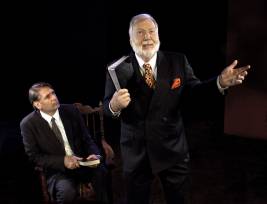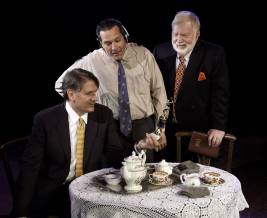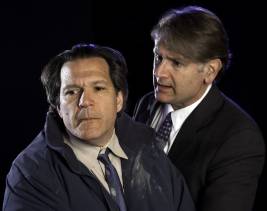
“And I am telling you, I’m not going!”
No, it’s not Effie White belting out a showstopper in Dreamgirls, but the spoken words of Dr. Philip Gottschall, an 81-year-old Texas megapreacher unwilling to give up the pulpit of a church he’s built up to a congregation of 30,000 and counting, and it’s not Deena Jones who’s in Eve Harrington mode, but 40something San Antonio pastor Jeremiah Mears, whom fully half of the pastoral search committee would like to see replace their aging leader. As for the other half, the status quo is fine, just fine.
Playwright David Rambo pits preacher against preacher in God’s Man In Texas, the latest offering from the newly re-energized Sierra Madre Playhouse, and if being forced to listen to considerable sermonizing by the kind of Christian fundamentalists who have recently made it their mission to “protect the sanctity of marriage” proved tough going in Act One, once Rambo’s central concern became evident in the play’s thoroughly compelling second act, this reviewer came to realize that any Act One discomfort was personal, and no reflection on what ends up one humdinger of a play.
 To be fair, the subject of same-sex marriage never comes up in God’s Man In Texas, though its two protagonists’ overlong Act One sermons are indeed all Old Testament-based, and to be honest, the actual amount of time these sermons take up is probably considerably less than it feels like. Thankfully, too, a third character provides a good deal of comic relief before himself becoming integral to the more gripping drama of the play’s second act.
To be fair, the subject of same-sex marriage never comes up in God’s Man In Texas, though its two protagonists’ overlong Act One sermons are indeed all Old Testament-based, and to be honest, the actual amount of time these sermons take up is probably considerably less than it feels like. Thankfully, too, a third character provides a good deal of comic relief before himself becoming integral to the more gripping drama of the play’s second act.
We first meet Jeremiah “Jerry” Meers (Christian Lebano) as he is about to give the first of several “audition” sermons and wishing only for a bit of meditation-friendly peace and quiet. Unfortunately, that’s the last thing he gets from Hugo Taney (Paul Perri), the chatty reformed drug/sex addict in charge of Rock Baptist’s TVBO (TV Broadcast Operation), a member of the church’s every single 12-step recovery group, and a man more likely to put his foot in his mouth than not. (“You look a lot taller on TV. Do you use a lower-than-average pulpit?”)
Jerry’s first sermon gets a qualified thumbs up from the venerable Dr. Gottschall (Ted Heyck), though Hugo, reading his boss’s mind, does suggest that next time Jerry start out “folksy, … with a cute story, something one of his kids said that was real cute,” advice which the younger preacher follows in sermon number two, which he opens by recalling a time when he convinced his broccoli-hating young son that he was being served “spinach trees,” thereby getting his boy to eat every last bite.
Unfortunately, Gottschall’s reaction to this second sermon is considerably less enthusiastic than Hugo’s, the older man finding it not, as Jerry would have it, “a parable from personal experience on obedience” but rather “a story about how you tricked your boy into eating broccoli,” just one of numerous times preacher and preacher will be butting heads, the octogenarian remaining steadfast in his belief that his word is and rightly should be law.
No wonder Gottschall ends Act One à la Effie White, booming out from the pulpit that “I’m not going anywhere until God says, ‘It’s time.’”
It’s in Act Two that things really get juicy, for sometime during intermission the abovementioned search committee has voted to have Jerry join Rock Baptist as Gottschall’s “co-pastor,” prompting the older man to react with righteous anger (and borderline paranoia) to his young competitor’s increasing popularity. Meanwhile, Jerry finds himself almost equally dissatisfied with having to share the spotlight with a man whose church leadership and management he finds increasingly faulty.
 Father-and-son relationships weave a provocative leitmotif throughout God’s Man In Texas. Jerry has two growing boys, though his own traveling salesman-turned-street preacher father went missing when Jerry was a teen, never to be heard from again. As for Gottschall, a son and heir was apparently not in God’s plan for the father of one (an “impaired” daughter), while Hugo too has his own father-son story, about which no surprise-spoiling details will be offered.
Father-and-son relationships weave a provocative leitmotif throughout God’s Man In Texas. Jerry has two growing boys, though his own traveling salesman-turned-street preacher father went missing when Jerry was a teen, never to be heard from again. As for Gottschall, a son and heir was apparently not in God’s plan for the father of one (an “impaired” daughter), while Hugo too has his own father-son story, about which no surprise-spoiling details will be offered.
To his great credit, playwright Rambo avoids demonizing Gottschall, a man whose refusal to cede power proves easy to empathize with, particularly for audience members of a certain age, nor does the playwright make a saint out of Jerry, whose ambitions threaten to get the best of his better nature. Hugo is equally complex, and ends up far more than merely the comic relief he seems at first to have been created to provide.
Fascinating too is the picture Rambo paints of a church so gigantic, it comes complete with college, Christian school, dinner theater, bowling alley, eight-screen Cineplex for family movies, Christian satellite network, restaurants, coffee shops, snack bars, fully-equipped gymnasium, two swimming pools, baby care, day care, counseling center… The list goes on and on.
Playwright Rambo has modernized his 2001 script just enough that Tim Tebow merits a mention, smart phones get used, and the play avoids becoming a ‘90s period piece, since as the French say, “Plus ça change …”
Nancy Youngblut makes a noteworthy Sierra Madre Playhouse directorial debut, and under her incisive guidance all three actors do splendid work.
Outstanding Lead Actor Scenie winner Lebano not only makes Jerry the kind of charismatic preacher the search committee’s more change-seeking faction would surely favor, he invests the part with depth and a just-right balance of strength and self-confidence tempered with some less laudable though entirely human weaknesses.
Heyck’s Gottschall may be a good decade younger than Rambo has written him, but what a powerhouse performance the stage and screen vet gives, making the still vital octogenarian a boiling caldron of vanity, arrogance, folksiness, paranoia, obstinance, self-doubt, and pride.
 Last but not least is Perri’s masterful, eminently watchable work as Hugo, whose assorted quirks and tics Rambo’s text only begins to suggest, which is to say that Perri takes an already well-written part and makes it arguably the evening’s most memorable, and never more so that when Act Two gives Hugo (and Perri) some truly meaty scenes on which to chew.
Last but not least is Perri’s masterful, eminently watchable work as Hugo, whose assorted quirks and tics Rambo’s text only begins to suggest, which is to say that Perri takes an already well-written part and makes it arguably the evening’s most memorable, and never more so that when Act Two gives Hugo (and Perri) some truly meaty scenes on which to chew.
God’s Man In Texas looks quite splendid on the Sierra Madre Playhouse’s classic proscenium stage. (Is there any other 99-seat theater in town that so resembles a scaled-down Pasadena Playhouse, minus the architectural frills?) D. Martyn Bookwalter’s scenic and lighting design combine to suggest opulence on a shoestring budget, with special snaps for the sound and light extravaganza that is the megachurch’s annual Christmas parade, the latter aided and abetted considerably by Scot Q. Merry’s sound design and Garrett James Mayer’s original music, both of them excellent throughout. Holly Victoria’s excellent costumes tell us much about the men who wear them even before they speak. Deborah Ross Sullivan’s dialect coaching is evident in the three actors’ Texas drawls.
Samantha R. Else is production stage manager, Annalise Lowry and Jake Miner Perri are assistant stage managers, and Roberta Barns and Barry Schwam are sound operators.
Following this past winter’s superb Lebano-directed Driving Miss Daisy, God’s Man In Texas provides even more challenging fare, offering fresh evidence that the New Sierra Madre Playhouse is no longer your parents’ or grandparents’ community theater. Though I can’t help wishing that Rambo had pruned down the Act One sermonizing that this particular reviewer found so alienating, God’s Man In Texas turns out to be quite a play, and one well worth driving over to picturesque Sierra Madre to experience.
NOTE: The role of Hugo will be played by Ken Lay on May 3, 4, and 5.
Sierra Madre Playhouse, 87 W. Sierra Madre Blvd., Sierra Madre.
www.sierramadreplayhouse.org
–Steven Stanley
April 26, 2013


 Since 2007, Steven Stanley's StageSceneLA.com has spotlighted the best in Southern California theater via reviews, interviews, and its annual StageSceneLA Scenies.
Since 2007, Steven Stanley's StageSceneLA.com has spotlighted the best in Southern California theater via reviews, interviews, and its annual StageSceneLA Scenies.







 COPYRIGHT 2025 STEVEN STANLEY :: DESIGN BY
COPYRIGHT 2025 STEVEN STANLEY :: DESIGN BY